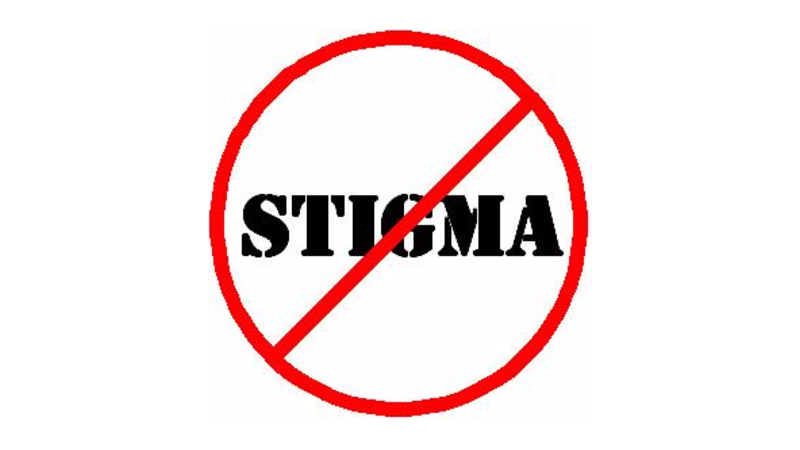Mental Illness, Stereotypes And Stigma

Mental illness carries stereotypes--no kidding!--these stereotypes lead to stigma, stigma leads to discrimination. It is a nasty cycle that is lessening with the passing years but exists nonetheless.
An Experiment for Comparison
What might happen if I took to the streets, walked through my middle-class neighborhood and knocked on a few of my neighbours doors, perhaps interrupt their dinner or pause their day for a few minutes?
I know these people. I like them and they like me, at least we pretend we do, adhering to social norms is important in society. So, they open the door and I smile, they smile. We exchange obligatory information on the weather, what we might be having for dinner, whether or not work is going well etc.
But I'm holding a clipboard. I explain that I am raising money to put together a conference focusing on eradicating the abuse of animals-- specially those who end up in shelters and may or may not be put down. This topic is close to my heart.
I can assure you: After an hour or two I would have enough donations to donate money to the cause, enough for a food bowl, a bed, or to sponsor an online promotion. I will have garnered respect! I am working hard to shatter the stigma associated with animals in shelters!
My clipboard is full of donations and names. Complete support! How lovely!
But a Mental Illness Stereotype & Stigma Experiment Wouldn't Go So Well
 Imagine I do the same thing in the context of mental illness. I knock on the same doors and I am armed with pamphlets on mental illness; information that educates and works to shatter the stereotypes and stigma associated with mental illness.
Imagine I do the same thing in the context of mental illness. I knock on the same doors and I am armed with pamphlets on mental illness; information that educates and works to shatter the stereotypes and stigma associated with mental illness.
If one in four people have experienced mental illness, one in four homes I visit would, statistically, have a person in them who understands what I am proposing--will they tell me they understand? Would they sign my petition and donate money to orchestrate a community meeting on the topic? I would like to think so--I would love to believe this would happen--but would it?
Here is the reality: At the end of the day, my feet tired from walking from home to home, from condominium to apartment buildings, the list would be much shorter. But names would exist.
I expect that they would be vague (the signatures, perhaps, hard to decipher) before the paper was signed the person might state something along the lines of: "Yes, I know someone..." and I would pass them the pen.
But would this person be living with a mental illness? Can you blame them for being hesitant? I, personally, could not.
The Reality of Stigma and Stereotypes Related to Mental Illness
The good news: Stigma and mental illness has gotten much better as the years pass. The media has made a positive impact--commercials now put a positive spin on it--I recently viewed one that focused on how common mental illness is.
Prejudice still exists, it always will, just as racism will never be completely eradicated, it's getting better. Much better.
Putting a face to the illness is hard. It was difficult for me, initially, to write this blog. To put my name and face online. To talk about mental illness as I do. But I am grateful to those of you who read about mental illness and talk about it--all of this helps to reduce stereotyping and stigma.
I hope, in the future, my campaign would have more names on it.
I am certain it would.
APA Reference
Jeanne, N.
(2012, April 2). Mental Illness, Stereotypes And Stigma, HealthyPlace. Retrieved
on 2025, November 9 from https://www.healthyplace.com/blogs/recoveringfrommentalillness/2012/04/mental-illness-stereotypes-and-stigma
Author: Natalie Jeanne Champagne
I totally relate to your comments about the stigma of mental illness. I have not been personally diagnosed except for three major episodes of depression over a forty year period. However I raised five children who each had some form of mental illness. One is bipolar, the second depressive and anxiety prone, third has ADHD, fourth was a late bloomer but also extremely intelligent in Math & Computers and a perfectionist. The fifth has asperger's syndrome, but none were diagnosed until they were adults partly because we just didn't know anything about mental illness at the time and partly because of my own fears that if we had a mental illness we were "crazy" and would be put away in an insane asylum for the rest of our lives. My oldest daughter was a happy socially adept very good student until her 11th birthday and soon after that became quiet, morose, sulking and refusing to communicate with us. The school counselor wanted to put her in a mental institution for a "child Study" when she was in middle school. I was so frightened that they would not let her back out that I refused to let her participate. Instead I quit my job and stayed home to give her constant supervision, She went to school, came home and if she went anywhere after school I made sure she had someone with her. I questioned and warned all her friends that if she got into any trouble I would hold them responsible. Usually I sent one of her sisters with her, even on dates. She grew up, got a job, lived with a girlfriend for a couple of years on their own and eventually married and had a daughter. Then she divorced the first husband and remarried. Her second daughter was absolutely textbook Asperger's. Came out screaming and screamed for the first three or four years of her life. Hand flapping, Tippy toed, Patterning, lining up toys etc. and having fits if anyone tried anything "new" or changed any of her things in any way. Once she got to an age she could make her needs understood she was easier to get along with but we still did not know what was wrong with her...just tried to keep her happy. When she was 13 a school counselor had just learned about Asperger's and finally she was diagnosed. Her school was very cooperative. Anything to get her to stop throwing fits in school. My daughter had to talk her through every possible situation BEFORE it happened. Once she knew what to expect it was okay unless, Heaven Forbid, any change in the routine. My granddaughters doctors noticed my daughters behavior during visits and suggested she see another Psychologist and my daughter was diagnosed as Bipolar at age 35. She has been on various medications and finally found one that works well but costs them $800.00 a month and is not covered by insurance. The second daughter has lived a quiet life, being so anxious about new situations made her pretty much a homebody, but at age 40 when she was beginning to go into menopause she suddenly seemed to lose her anxieties and fears and started to join groups, take dance and exercise classes, volunteered at a local preschool. Who knows why but we are happy for her. The third daughter with ADHD. We always just made allowances and restricted her movements in places she might get into trouble. We taught her to use her excess energies by working or exercising. She still hardly ever sleeps, constantly in motion, but has married and raised three children and now four grandchildren. Two of her children also have ADHD and one is married to a Bipolar. The third tends to depression at times but lives a reasonably normal life (What is NORMAL?) One of her grandchildren is ADD and another unusually adept at puzzles and counting although he is only 2 years old. The fourth child my oldest son didn't walk or speak until he was about 18 months old. But when he did learn to speak spoke in sentences not just words. Never babbled baby talk. He also could count money as fast as you could put a coin in his hand between ages 2 & 3. And eventually would tell you how much candy he could buy with that amount. He had a little trouble reading at first but excelled in all the Math subjects in school and when he found computers in his sophomore year in high school, he was "in love". He was a straight A student and earned a full scholarship his first year of college, but the college didn't have good computer courses so he switched to another for the rest of his education. He graduated with a double major of Math and Computer Engineer. Again with a 4.0 average and pretty much had his pick of jobs in the computer field which was just getting started at the time. All this was with another handicap, He was nearly deaf from about age 5. He never had special needs classes since he read lips and except for talking to teachers about placing him where he could read their lips he didn't have any special consideration in school. In College he finally was fitted with a hearing aid but turned it off as the noise distracted him most of the time. My fifth child has Asperger's. We didn't realize it until my granddaughter was diagnosed and we didn't raise him as a person with disabilities. Just kept him happy and luckily he was never a behavior problem. His daughter was diagnosed with Asperger's at about 3 years old. Now we know how to deal with it she is now in high school and no longer needs special classes. She is learning to read peoples faces and body language and recognizes jokes and other non-literal remarks for what they are. She still sometimes blurts out phrases that seem quirky to others but has learned to keep them to herself most of the time.
Thank you for listening to my long story.
Hi, Darlene:
First, "long" stories are often the best! It was difficult for my parents raising one child with a mental illness, it make the family dynamic difficult, so I admire your ability to juggle all the pain that comes with the territory of mental illness--but also the joy when things go well.
I understand that Autism and Asperger's were not commonly diagnosed until recently so it must have been difficult in that respect, being unsure as to what was wrong.
When younger, and to a lesser degree even now, I find change, as your daughter, very difficult--sometimes impossible!
If I can say, and I suppose I am, you seem like a wonderful and supportive person and mother.
Thank you for your story!
Sincerely,
Natalie
Really enjoyed your comparison of collecting signatures/donations for the 2 causes you mentioned and how each one would be received. This would be something worth trying out, just for confirmation. I'm glad there's more than ever before discussion around MI, but we've a long way to go still and I look forward to the day where the compassion and understanding afforded animals or other causes, is given willingly for mental health.
Hi, Barb:
I am glad you enjoyed it!:) It would be a good idea to test it out.
Thanks for your comment,
Natalie
hi natalie,
i really appreciate your effort for doing such a commendable work.we should not be hesitant in discussing such things as if when change is needed we should always start at our end.....
thanks
Hi, Rachel:
Thank you for appreciating the content--I am glad you can relate to the idea.
Sincerely,
Natalie
What a lovely description of stigma and how our neighbors might react to the idea. Beautifully written and sadly true.
Thank you!
Hi, Janet
Many thanks for the positive feedback.
Sincerely,
Natakue